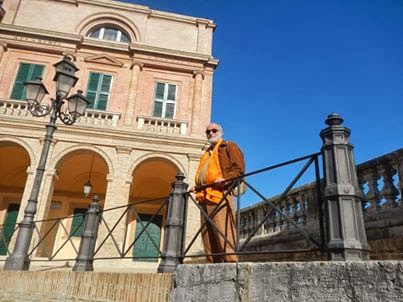
Once again I have questioned myself on the implementation of a natural or lay spirituality and how it can affect our daily lives, especially considering that today our life in the world must correspond to the needs of efficiency and participation, as in society, forms of "absence" that are specifically directed towards spiritual research are no longer accepted.
This above all in the awareness that lay spirituality can not be included in any "religious" strands ... There are communities and aggregations for Christians, Mohammedans, Buddhists ... in short, for the "committed" in religions, and that's it! life "in the world" is more congenial, also because our research never goes beyond the self ... and the self is present everywhere and at all times ...
The individual I (ego) rises from the reflection of consciousness in the mirror of the mind. An identifying overlay with the observed object. The object is the body-mind that reacts in relation (to contact) with the other external objects. The moment that, in self-knowledge, the fictitious identity with the agent vanishes what is left is pure awareness. It is therefore not necessary, for the purpose of realization, that the images - the world and the observer - disappear, it is sufficient that the false identity with the reflected object / subject (ego) disappears.
This means that the world can safely continue to manifest itself not being perceived as a separate reality, more or less as we might consider a dream with respect to the dreamer. At this point the Self and its manifestation are seen as the exact same thing while the sense of the separative ego (of the me and the other) is obliterated.
After all, dualism is only ignorance of Self. The sage observes the actions carried out without there being any inclination or intention or judgment in him. Spontaneously everything happens appropriately and consequently to the designated "destiny". Destiny is the answer to the natural interaction (and predisposition) of the various elements and psychic aspects involved...
Since everything happens automatically there is no "preference" in the action of the sage. On the contrary, his own action is (apparently) intentional only in the eyes of the "others", since for the sage everything happens in itself.
Every event experienced simply happens in his presence and he is the silent and detached witness. His action (or state) can be compared to sleepwalking, or awake sleep.Moreover, the concept of "destiny" or of deliberate action only makes sense in the mind of the observer still identified with the outside, that is, of an ego that identifies itself with the agent and with his actions. But the moment - as already mentioned - that this identification is destroyed every other connected concept disappears.Wisdom consists in remaining immune from illusion after understanding the truth.
The fear of action and its consequences (karma) remains only in those who see the slightest difference between themselves and others. As long as the idea exists that the body / mind is the self, one can not be an expression of truth. But certainly it is possible for anyone, and in every condition, to know their true nature because it is absolutely true and real, it is the only one for everyone.
In fact, the state of pure Being is common to all and is the direct experience of each one. To live one's true nature is meant by self-realization, since the self is present here and now.The thought of feeling separate is the only obstacle to the realization of the Omni-pervading and omnipresent Being. Yet more, from the empirical point of view, identifying with the agent (ego) is an impediment to the proper functioning of the psychosomatic apparatus, in the context of global functioning. Thus the intellectual acceptance of truth is already a liberating form of intentional (rational) propensity to act. What is destined to happen will happen.
Paolo D'Arpini

Testo italiano:
Ancora una volta mi sono interrogato sull’attuazione di una spiritualità naturale, o laica, e di come essa possa influire sulla nostra vita quotidiana, soprattutto in considerazione che oggigiorno la nostra vita nel mondo deve corrispondere ad esigenze di efficienza e di partecipazione, in quanto nella società non sono più accettate forme di “assenza” che siano specificatamente dirette alla ricerca spirituale.
Questo soprattutto nella consapevolezza che la spiritualità laica non può essere inserita in alcun filone “religioso”… Esistono comunità ed aggregazioni per cristiani, maomettani, buddisti.. insomma per gli “impegnati” nelle religioni, e basta!Tutto sommato ritengo che per noi laici la vita “nel mondo” sia più congeniale, anche perché la nostra ricerca non esula mai dal sé.. ed il sé è presente ovunque ed in ogni tempo…
L’io individuale (ego) sorge dal riflesso della coscienza nello specchio della mente. Una sovrimposizione identificativa con l’oggetto osservato. L’oggetto è il corpo-mente che reagisce in relazione (al contatto) con gli altri oggetti esterni.Il momento che, nell’autoconoscenza l’identità fittizia con l’agente svanisce quel che resta è la pura consapevolezza. Non è perciò necessario, al fine della realizzazione, che le immagini -il mondo e l’osservatore- scompaiano, è sufficiente che la falsa identità con l’oggetto/soggetto riflesso (ego) scompaia. Ciò significa che il mondo può tranquillamente continuare a manifestarsi non essendo percepito come realtà separata, più o meno come potremmo considerare un sogno rispetto al sognatore.
A questo punto il Sé e la sua manifestazione sono visti come la stessa identica cosa mentre il senso dell’io separativo (del me e dell’altro) viene obliterato.
In fondo il dualismo è soltanto ignoranza di Sé.Il saggio osserva le azioni svolgersi senza che vi sia alcuna propensione o intenzione o giudizio in lui. Spontaneamente ogni cosa avviene confacentemente e conseguentemente al “destino” designato. Il destino è la risposta alla naturale interazione (e predisposizione) dei vari elementi ed aspetti psichici coinvolti…
Siccome tutto succede automaticamente non vi è alcuna “preferenza” nell’agire del saggio.
Anzi il suo stesso agire è (apparentemente) intenzionale solo agli occhi degli “altri”, giacché per il saggio ogni cosa accade di per sé. Ogni evento vissuto accade semplicemente in sua presenza e lui ne è il testimone silenzioso e distaccato. Il suo agire (o stato) può essere paragonato al sonnambulismo, od al sonno da sveglio.
Ed inoltre anche il concetto di “destino” o di azione deliberata ha un senso unicamente nella mente dell’osservatore ancora identificato con l’esterno, ovvero di un ego che si identifica con l’agente e con le sue azioni. Ma il momento -come già detto- che tale identificazione è distrutta ogni altro concetto collegato scompare.
La saggezza consiste nel rimanere immune dalla illusione dopo aver compresa la verità. La paura dell’agire e delle sue conseguenze (karma) permane solo in chi vede la pur minima differenza fra sé e l’altro. Finché esiste l’idea che il corpo/mente è l’io non si può essere espressione di verità. Ma certamente è possibile per chiunque, ed in ogni condizione, conoscere la propria vera natura poiché essa è assolutamente vera e reale, è l’unicum per ognuno.
Questo soprattutto nella consapevolezza che la spiritualità laica non può essere inserita in alcun filone “religioso”… Esistono comunità ed aggregazioni per cristiani, maomettani, buddisti.. insomma per gli “impegnati” nelle religioni, e basta!Tutto sommato ritengo che per noi laici la vita “nel mondo” sia più congeniale, anche perché la nostra ricerca non esula mai dal sé.. ed il sé è presente ovunque ed in ogni tempo…
L’io individuale (ego) sorge dal riflesso della coscienza nello specchio della mente. Una sovrimposizione identificativa con l’oggetto osservato. L’oggetto è il corpo-mente che reagisce in relazione (al contatto) con gli altri oggetti esterni.Il momento che, nell’autoconoscenza l’identità fittizia con l’agente svanisce quel che resta è la pura consapevolezza. Non è perciò necessario, al fine della realizzazione, che le immagini -il mondo e l’osservatore- scompaiano, è sufficiente che la falsa identità con l’oggetto/soggetto riflesso (ego) scompaia. Ciò significa che il mondo può tranquillamente continuare a manifestarsi non essendo percepito come realtà separata, più o meno come potremmo considerare un sogno rispetto al sognatore.
A questo punto il Sé e la sua manifestazione sono visti come la stessa identica cosa mentre il senso dell’io separativo (del me e dell’altro) viene obliterato.
In fondo il dualismo è soltanto ignoranza di Sé.Il saggio osserva le azioni svolgersi senza che vi sia alcuna propensione o intenzione o giudizio in lui. Spontaneamente ogni cosa avviene confacentemente e conseguentemente al “destino” designato. Il destino è la risposta alla naturale interazione (e predisposizione) dei vari elementi ed aspetti psichici coinvolti…
Siccome tutto succede automaticamente non vi è alcuna “preferenza” nell’agire del saggio.
Anzi il suo stesso agire è (apparentemente) intenzionale solo agli occhi degli “altri”, giacché per il saggio ogni cosa accade di per sé. Ogni evento vissuto accade semplicemente in sua presenza e lui ne è il testimone silenzioso e distaccato. Il suo agire (o stato) può essere paragonato al sonnambulismo, od al sonno da sveglio.
Ed inoltre anche il concetto di “destino” o di azione deliberata ha un senso unicamente nella mente dell’osservatore ancora identificato con l’esterno, ovvero di un ego che si identifica con l’agente e con le sue azioni. Ma il momento -come già detto- che tale identificazione è distrutta ogni altro concetto collegato scompare.
La saggezza consiste nel rimanere immune dalla illusione dopo aver compresa la verità. La paura dell’agire e delle sue conseguenze (karma) permane solo in chi vede la pur minima differenza fra sé e l’altro. Finché esiste l’idea che il corpo/mente è l’io non si può essere espressione di verità. Ma certamente è possibile per chiunque, ed in ogni condizione, conoscere la propria vera natura poiché essa è assolutamente vera e reale, è l’unicum per ognuno.
Infatti lo stato di puro Essere è comune a tutti ed è la diretta esperienza di ciascuno. Vivere la propria vera natura questo si intende per auto-realizzazione, poiché il sé è presente qui ed ora.
Il pensiero di sentirsi separati è il solo ostacolo alla realizzazione dell’Essere onni-pervadente ed onnipresente. E pure dal punto di vista empirico identificarsi con l’agente (ego) è un impedimento al buon funzionamento dell’apparato psicosomatico, nel contesto del funzionamento globale. Per cui già l’accettazione intellettuale della verità è una forma liberatoria dalla propensione intenzionale (razionale) ad agire. Ciò che è destinato ad accadere accadrà.
Il pensiero di sentirsi separati è il solo ostacolo alla realizzazione dell’Essere onni-pervadente ed onnipresente. E pure dal punto di vista empirico identificarsi con l’agente (ego) è un impedimento al buon funzionamento dell’apparato psicosomatico, nel contesto del funzionamento globale. Per cui già l’accettazione intellettuale della verità è una forma liberatoria dalla propensione intenzionale (razionale) ad agire. Ciò che è destinato ad accadere accadrà.
Paolo D'Arpini


Commento di G.F.: “La mitologia della consapevolezza, perseguibile e irraggiungibile. Promette ma non mantiene, non succede nulla nel silenzio del mondo...”
RispondiEliminaMia rispostina: “La consapevolezza è esistenza. Questa verità è espressa chiaramente persino nel detto biblico, che in italiano è tradotto impropriamente dalla chiesa (per interessi di bottega), gli inglesi hanno la traduzione più confacente: "I am that I am", ovvero "Io sono quell'io sono", cioè la consapevolezza...” (P.D'A.)
“Ridere, è rischiare di apparire matti…
RispondiEliminaPiangere, è rischiare di apparire
sentimentali…Tendere la mano,
significa rischiare di impegnarsi…
Mostrare i sentimenti, è rischiare
di esporsi… Far conoscere le proprie
idee ed i propri sogni, è rischiare di
essere respinti… Amare, è rischiare
di non essere contraccambiati…
Vivere, è rischiare di morire…
Sperare, è rischiare di disperare…
Tentare, è rischiare di fallire…
Ma noi dobbiamo correre il rischio!
Il più grande pericolo nella vita
è quello di non rischiare.
Colui che non rischia niente…
non fa niente…
non ha niente…
non è niente”
(Rudyard Kipling)